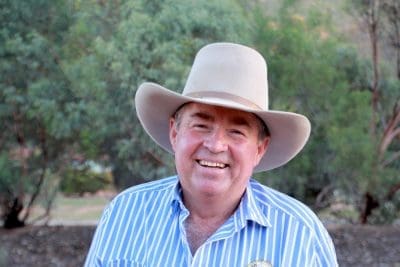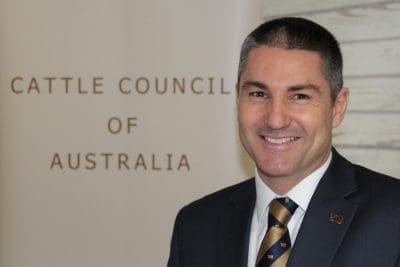CATTLE producers would “vote with their feet” against banks which turned their backs on an industry many relied upon, Northern Territory Cattlemen’s Association president Chris Nott said in response to recent reports of banks shunning businesses involved in livestock exports.
 Anecdotal reports of banks bowing to animal rights group pressure to cut off finance to businesses connected to the industry have sparked angry responses from livestock export and cattle producer leaders.
Anecdotal reports of banks bowing to animal rights group pressure to cut off finance to businesses connected to the industry have sparked angry responses from livestock export and cattle producer leaders.
NTCA president and Alice Springs cattle producer Chris Nott said MLA ranked the livestock export trade as Australia’s fourth most valuable market, and producers would vote with their feet if banks turned their back on the industry.
“When you consider how much live export is worth in the scheme of the Australian beef industry, they’re playing in a dangerous patch,” he said.
Banks were overstepping by attempting to set standards for an industry already subject to high levels of industry and Government regulations.
Last year’s Royal Commission into Misconduct in the Banking, Superannuation and Financial Services suggested banks should be more focused on fixing their own back yards, he said.
“The message I can get out of this is just look at what happened to the supermarket shelves when the panic buying started, it was beef and toilet paper,” he said.
“Banks need to realise the biggest thing for the next 20 years is going to be water security, food security, and power.
“When you take a long term view about food security and developing the north, if I was a banker I’d be mad to be sticking my head out that far.
“Don’t worry about starting to dictate and putting pressure on us with double standards, it is short-sightedness.”
Cattle Council of Australia CEO Travis Tobin (below) said all producers who follow the rules and operate within the law should have access to finance based on their credit history and ability to service a loan.
 “Live export is an important part of the beef industry,” he said.
“Live export is an important part of the beef industry,” he said.
“It is a key market for producers and employs thousands of people in rural and regional Australia.”
A livestock exporter told Beef Central that he recently tried to open a business account but was rejected by several banks.
He said none of the banks would give him an explanation in writing, but said he was told verbally by representatives at each bank that his application would not be supported because he worked in the livestock export trade.
He said banks should be upfront about their policy.
“My point to them is, if that is the way you want to go, at least have the guts to tell everyone,” he said.
“Go and tell all these farmers in northern Australia who are paying you millions in interest that you are actively trying to shut down the industry that keeps them alive.“
The Australian Livestock Exporter’s Association said banks changing agricultural lending policies in response to animal rights group pressure were overlooking the significant amount of work invested in animal welfare by the industry, and were “just creating further business models for animal activist organisations”.
 “This does not promote or support the industry and the genuine care producers, exporters and importers have for the animals in the supply chains,” ALEC CEO Mark Harvey-Sutton (right) said.
“This does not promote or support the industry and the genuine care producers, exporters and importers have for the animals in the supply chains,” ALEC CEO Mark Harvey-Sutton (right) said.
The livestock export industry is determined to continually achieve improvements in the industry’s sustainability and animal welfare outcomes, and continued to implement industry-led changes and uphold regulatory requirements, he said.
Australia’s livestock export industry was well recognised as a global leader in live export and animal welfare, and had invested in countless initiatives that can quantify best-practice.
The Australian Beef and Sheep Meat Sustainability Frameworks, which were reviewed annually, were examples of world-leading, industry-led initiatives developed across the supply chain.
“Livestock exports are an important part of Australian agriculture providing our trading partners with certainty around food security and fulfilling our global responsibilities at this challenging time of COVID-19,” he said.
“We would encourage all financial institutions to acknowledge the importance of the live export industry, the economic contribution and choices it offers to our producers, and importantly especially at this time the job security for regional Australia throughout the whole of the supply chain.”
‘Radical activism’ the last thing we need in our banks
The apparent refusal of some banks to lend to industries they believe are “socially sensitive” – such as firearms and live animal exports – has been condemned by AgForce as not only discriminatory but an irresponsible handbrake on economic and jobs growth.
CEO Mike Guerin acknowledged that banks needed to have robust lending criteria but said that singling out certain industries to suit ‘activist agendas’ jeopardised the agriculture industry when it was most needed.
“It is worrying that some banks appear to be compromising sensible and appropriate commercial decisions because of intimidation by single-issue activists, in some cases within their own senior staff,” Mr Guerin said.
“Australia’s financial institutions are vital partners in Australian agriculture, enabling farm businesses and the industries which support them to develop and grow.
“To jeopardise the immediate viability and, longer term, the capacity for growth of our agriculture industry at this critical point in human history on the whim of a minority is foolish – and also poor business sense.”
Mr Guerin said AgForce had approached the Australian Banking Association to address its concerns at a national level.
AgForce Cattle President William Wilson said that if banks ‘played’ to social politics, they jeopardised a multi-million industry that supported thousands of family grazing properties, tens of thousands of farm workers and ag tradies, and rural communities Australia-wide.
“Banks are not regulators, they are not the government and they certainly aren’t society’s moral compass,” Mr Wilson said.
“The industries we’re talking about are well regulated and operate at world best standard.
“For example, the live animal export industry is a major contributor to the Australian economy, helps keep our ag industry strong and viable, and provides people at home and overseas with access to quality, affordable animal protein.
“These businesses are happy to provide their banks with any information about their operations or their viability to enable sound, mutually beneficial lending decision to be made – but don’t want to be ‘singled out’ and penalised due to the personal views of a staff member.
“It is vital that banks do not base decisions that affect Australia’s food security and our ability to bounce back economically post-COVID on the views of radical groups that do not in any way represent the opinions of the average Australian.”


I agree wholehartly with your above comments.The talk among many of our grass root producers is slowly inching towards are our main stream banks starting to appear as wolves in sheep’s clothing.Long gone are the days when on a Friday arvo i as a young bloke I would accompany my old dad along with our bank manager down to the corner pub where every thing bushy like wheat her ,stock prices,land for sale rumours would be discussed at not at a too serious tempo. Now many of us really do not know who our manager is,have a number to ring in Melbourne ,jump through so many hoops to achieve very little.